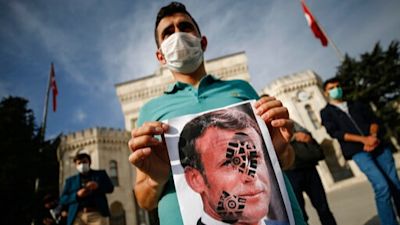Turkish President Erdogan calls for French goods boycott in Islam row

Turkish President Recep Tayyip Erdogan has called on Muslims to boycott French goods in an intensifying row over caricatures of the Prophet Muhammad and the right to free speech.
Erdogan said that French President Emmanuel Macron had lost his way and needed his head examining after he refused to denounce caricatures of the Islamic prophet.
In a statement, Erdogan said: "I call on my people to not buy French products.
"Not a day goes by that we do not see a vulgar and despicable act targeting our Prophet and our holy book, the Quran.
"Such attacks have begun to take place on the walls upon the encouragement of the leader of France who needs mental check."
France responded to Erdogan's comments by recalling its ambassador to Turkey.
Muslims across the Middle East have called for boycotts of French products amid protests over the depictions of the Prophet Muhammad.
Stores in Kuwait have pulled French yoghurts and bottles of sparkling water from their shelves and calls to boycott the Carrefour grocery store chain were trending on social media in Saudi Arabia and the United Arab Emirates.
Qatar University has cancelled a French culture week and further protests have been held in Turkey and the Gaza Strip with another planned in Pakistan.
It comes weeks after a history teacher who opened up a discussion with with students on caricatures of Islam’s Prophet Mohammed was decapitated in a street near Paris.
The incident has ignited a debate over such depictions which are considered blasphemous and offensive by Muslims but have been vigorously defended by French President Emmanuel Macron as protected under the right to free speech.
At a memorial for the teacher, Samuel Paty, last week, Mr Macron said: “We won’t renounce the caricatures.”
In tweets published in both Arabic and English on Sunday, he wrote: “We will not give in, ever.”
He added, however, that France does not accept hate speech and respects all differences.
His government plans a bill aimed at rooting out what Macron calls “Islamist separatism,” which he contends has created a parallel culture in France, one that rejects French laws and norms.
While he blamed some of this separatism on France’s brutal colonial past in North Africa, he was quoted as saying Islam is “a religion that is in crisis all over the world” and that Muslim positions are “hardening.”
On Monday, hashtags in Arabic on Twitter calling for French boycotts were trending.
Egypt’s top cleric, Sheikh Ahmed el-Tayeb condemned what he said was France's systematic campaign aimed at dragging Islam into political conflicts and discord.
Pakistan’s Prime Minister Imran Khan said the French leader chose to encourage anti-Muslim sentiment and deliberately provoke Muslims by encouraging the display of blasphemous cartoons targeting Islam.
Pakistan also summoned the French ambassador to lodge a protest over Macron’s condoning of the caricatures.
Amid the political barbs, neither Erdogan nor Khan has publicly condemned the killing of the French teacher Mr Paty.
Muslim scholars have condemned the caricatures, but some also sought to curb swelling anger.
Saudi Arabia’s senior council of clerics issued a statement saying that defamation of the Prophet Muhammad only serves extremists who want to spread hatred.
While denouncing insults against Islam, the clerics also cited the prophet’s “mercy, justice, tolerance” in their statement.
The head of the Saudi-based Muslim World League, Sheikh Mohammed al-Issa, told a Saudi news channel that while caricatures of the Prophet Muhammad are insulting to Muslims, the prophet’s influence and status are greater than any impact from such drawings.
He said Muslims should not overreact, and that the prophet himself faced insults much worse in his lifetime but showed Muslims the right way to act with patience and manners.
Meanwhile, the trial over the Charlie Hebdo massacre in 2015 is currently underway in Paris. Twelve people were killed after the satirical newspaper published caricatures of the Prophet Muhammed.
Last month, a knife attack outside the former Paris offices of Charlie Hedbo was called "an act of Islamist terrorism," by France's interior minister.